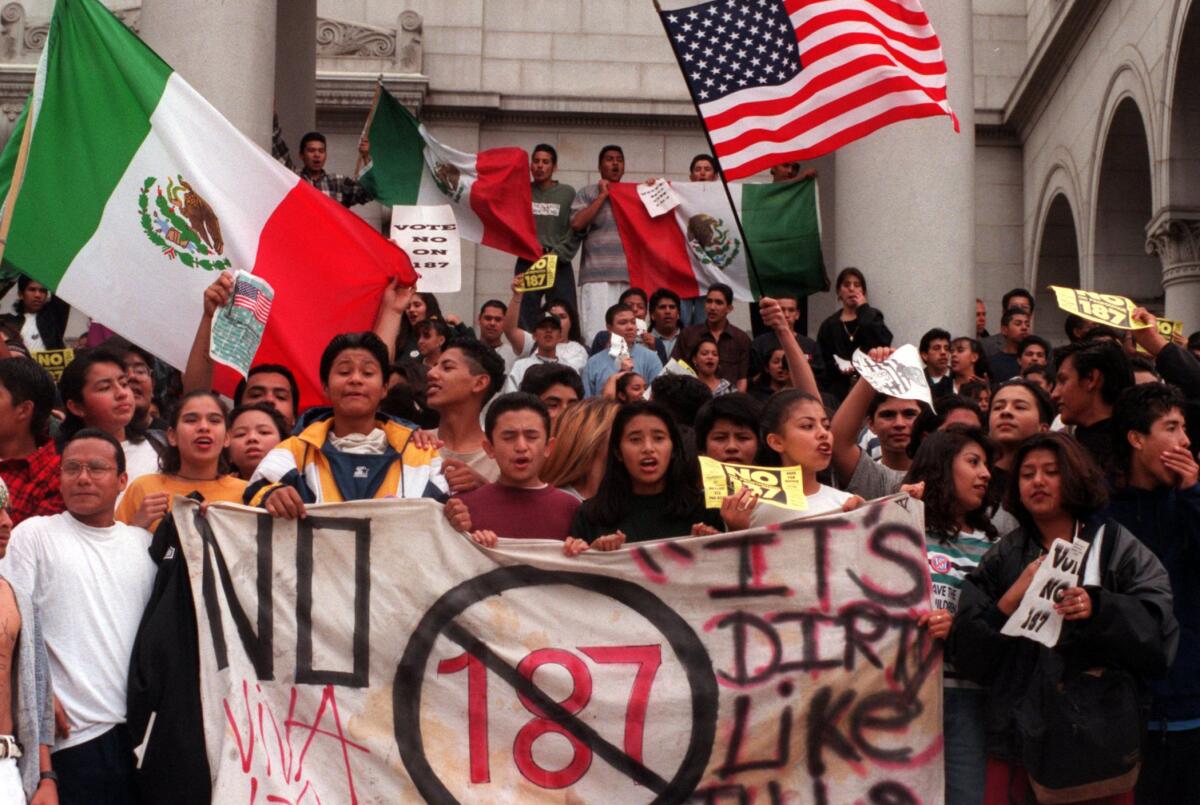Is the Republican Party poised for a comeback with Latinos?

- Share via
Mike Garcia, who recently won a special election for California’s 25th Congressional District seat, is a self-described “first-generation Hispanic American,” whose father immigrated with his family from Mexico. He is also a Republican. And while that fact puts him out of step with many California Hispanics, he isn’t as much of an outlier as you might think.
California is a blue state, and Latinos in the state skew Democratic, too. But in 2016, according to CNN exit polling, 24% of the approximately 3 million Latinos who voted in California cast ballots for President Trump. And while only about 15% of the state’s Hispanic voters are registered Republicans, nearly a third of California Latinos say they are conservative, and another 30% describe themselves as moderate.
Garcia, a U.S. Naval Academy alum, former fighter pilot and Raytheon executive, holds positions in line with many conservatives. He supports construction of a border wall, believes in a strong national defense and wants to stem the “push for socialism in our country.”
Latino Republicans like Garcia are heirs to a conservative movement that started in California more than half a century ago. The first Hispanic group formed to rally national support for a Republican, Latinos con Eisenhower, was founded by Mexican Americans here. And California Mexican Americans were also the first Latinos to hold prominent roles in Republican presidential administrations.
When I began researching my book on the Hispanic Republican movement, I wrongly assumed it had started in Florida, led by Cuban exiles. What I found instead is that Cubans weren’t influential within the Republican Party until the 1980s, when they gained clout during President Reagan’s first term.
Mexican Americans in California, by contrast, joined the Republican Party in significant numbers through the 1950s and 1960s, back when the state generally was far more conservative than it is now. In many ways the fit with the party was natural for a constituency that valued family, church and work so highly. And many Latinos at the time felt that they’d been ignored by Democrats, who tended to come around only when they needed votes.
California politicians like Richard Nixon and Ronald Reagan — with the help of political strategists such as Stuart Spencer — reached out to the burgeoning Hispanic population in new ways. Unlike Eastern politicians, who saw civil rights primarily in black and white, Nixon and Reagan were familiar with their communities and understood their concerns.
One Mexican American from California wrote that Nixon, whose family owned a gas station and grocery store in Whittier, “got to know us while we lived our culture in accord with our values: God, family, hard work, respect for the law, and an aversion to handouts.” Reagan, meanwhile, rode on horseback alongside the descendants of Californios — Mexicans who settled in California long before it was a state — from the southern border to Sacramento. When Reagan ran for president, he said that during his tenure as governor he hired more Mexican Americans than any of his predecessors.
It was during Reagan’s first term that relations began to sour between GOP leaders and California’s Hispanic Republicans, who were dismayed at the party’s growing nativist policies. Reagan himself didn’t think a wall should divide the United States and Mexico, but other Republicans had begun calling for one. And when Congress put forth comprehensive immigration reform, Hispanic Republicans supported the bill’s amnesty provision but were skeptical of employer sanctions, which they feared would lead to discrimination against Hispanics.
Relations between California’s Hispanic Republicans and party leadership hit a new low in 1994, when Gov. Pete Wilson championed Prop. 187, a California ballot initiative barring undocumented Californians from receiving public benefits, including schooling and healthcare. When the head of a local Republican National Hispanic Assembly chapter criticized the law, which ultimately passed but was then thrown out by the courts, one of its authors called him a “fat burrito eater.” Such expressions of anti-Mexican sentiment led many Hispanic Republicans to leave the party.
The transformation in California politics happened quickly, but it was never complete. And nationally, too, many Hispanics remained part of the GOP. From 1972 forward, and with only a couple exceptions, Republican candidates have won between a quarter and a third of the Latino vote, sometimes a little more.
Garcia’s special election victory isn’t the bellwether that the president and other Republicans would like it to be. They see it as a sign of momentum for Trump and an indicator that he may have the ability to make headway, even in districts like Garcia’s, which is 35% Hispanic. But that is almost certainly wishful thinking.
What Garcia’s success does do, however, is remind us that Latinos, even in California, are a diverse group with a wide variety of opinions on issues including immigration, healthcare and the economy.
If Joe Biden and Democrats don’t do more to engage Latinos in California in a sustained way, to convince them that their policies are more likely to benefit them individually and their community as a whole, they aren’t likely to eat into the quarter share of the Latino vote here that Republicans continue to win.
On the other hand, if Republicans don’t return to the era before Proposition 187 when they believed that Hispanics would be an important part of their party’s future, this ceiling isn’t likely to reach any higher.
Geraldo Cadava is a professor of history and Latina and Latino Studies at Northwestern University and author of “The Hispanic Republican: The Shaping of an American Political Identity, From Nixon to Trump.”
More to Read
A cure for the common opinion
Get thought-provoking perspectives with our weekly newsletter.
You may occasionally receive promotional content from the Los Angeles Times.









